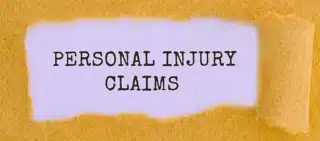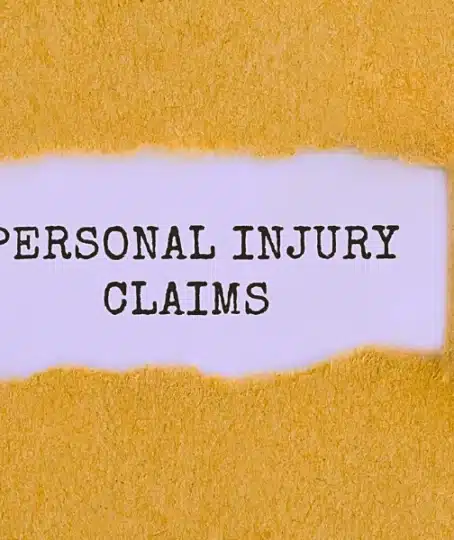
Overview of the Personal Injury Claim Process in Illinois No one expects to suffer an injury or get involved in...


You may want to know the personal injury claim process after getting injured due to another party’s or entity’s negligent or reckless actions. This process entails the steps and procedures that allow you to pursue compensation after suffering injuries because of someone else’s negligence. It involves seeking medical attention, notifying the insurance company about the accident, and hiring a personal injury lawyer. The lawyer handles investigations, calculates settlement amounts, oversees settlement negotiations, and represents your best interests in court if necessary.
If you have been injured in Peoria, Bloomington, Springfield, or Chicago, you can rely on personal injury attorneys at Strong Law Offices in Bloomington to help you get full compensation. With almost 3 decades of experience, our attorneys can help you understand the claims process and can provide legal support and guidance tailored to your case. Phone us at 309-393-2928 to schedule an appointment. You pay nothing unless you win the case.

No one expects to suffer an injury or get involved in an accident. Such an event can leave you confused and disoriented. After the accident, you need medical care, not to mention the financial losses that come from property damage. Fortunately, the Illinois accident injury claim process allows you to recover the damages you suffer in an accident caused by another party. The claims process consists of the following stages:
Your health is paramount. Once you get seriously injured in an accident, call 911 to inform the police and request emergency medical services. If you can still move and operate independently, visit an Emergency Room (ER) or schedule an appointment with your primary physician.
Don’t fail to seek immediate medical attention, even if you think you are unhurt. Remember, some injuries occur internally, and the symptoms appear after weeks or months. Seeking immediate medical attention allows the doctor to identify and document external and internal injuries, which is critical to the case.
Call your insurance carrier or the other party's insurer and notify them of the incident. Insurance companies require claimants to provide prompt notifications within a limited timeline. You don't have to record a statement. Instead, provide the basic information and politely decline to answer questions about the accident.
Most accident victims are often confused about when to hire a personal injury lawyer. The accident that caused your injuries may seem straightforward, and you might decide to settle your own personal injury case. It is, however, advisable to seek legal help as soon as possible, regardless of the severity of your injuries. A Bloomington personal injury lawyer will have experience with the personal injury claims process in Illinois. The lawyer can help you with the legal documentation required when filing various personal injury cases.
One thing you must always keep in mind is that insurance companies are usually not on your side. They will do anything to deny your claim or lowball your compensation. A lawyer will likely know what to do and what to say when dealing with insurers to coax them to pay the highest possible settlement.
Knowing what to expect during the claims process can help you set appropriate expectations.
Only a small percentage of personal injury cases end up in court. Typically, the involved parties, their attorneys, and insurance companies negotiate a fair settlement out of court. Sometimes, these parties fail to meet a mutually satisfactory agreement. In such a scenario, your attorney will file a lawsuit against the at-fault party. The case then goes to trial. Trials are generally lengthy due to the time-consuming discovery and the possibility of the defendant appealing the verdict.
You first begin by filing the claim in a circuit court. The state has 25 circuits across 102 counties. You can file the claim in the county where the accident happened or where the business or individual you are suing operates or lives.
The type of court in which you file the claim depends on the compensation amount you are pursuing. If you are suing someone for less than $10,000, you will file in a small claims court. Any claim worth over $10,000 but less than the limits set by the circuit court goes through a court-annexed mandatory arbitration process.
As specified under the Illinois statute of limitations, accident victims can only file a claim within two years from the accident date. Failure to file within that timeframe nullifies your case. Nonetheless, there are exceptions to the statute of limitations, and a personal injury case can be reopened even after this term has elapsed. A lawyer can evaluate your case and probe the court for the filing deadline extension, ensuring your rights and finances are protected.
After you have filed the claim and the defendant is made aware of the complaint, the defendant must issue a response within 30 days of receiving the notice. This response may involve the defendant admitting or denying the claim. In the latter, the defendant may present defenses, such as the claimant's negligence or contribution to the accident. The defendant may also file a motion to dismiss, arguing that your claim lacks merit. The court will dismiss the case if the defendant proves your claim lacks merit. In most cases, however, the court allows you to amend the claim.
A personal injury lawyer can be highly valuable to your case because the lawyer will protect your legal rights and fight for maximum compensation. A lawyer performs various tasks in a personal injury case, including:
A personal injury lawyer conducts an independent investigation into your case to gather the relevant evidence to support your claim. The evidence may include:
A lawyer can also obtain and organize various legal documents, including medical bills, financial records, and doctor's reports. Some evidence gets lost with time. So, it is best to involve an attorney early on to ensure he or she gathers fresh and strong evidence.
Some personal injury cases, such as truck accidents or playground injuries, may have multiple at-fault parties. An individual, business, or entity you never thought could have been involved can be liable, and a lawyer can prove their fault. A lawyer can investigate each party's contribution to your injuries and prove their liability.
“How much is my case worth?” That's a question most personal injury claimants ask. A lawyer will have experience with the various legal methods for calculating economic and non-economic damages. Calculating economic damages is rather straightforward, as it involves adding up the medical bills, lost income, private payments, and long-term treatment costs.
Calculating non-economic damages is more complicated because the costs are intangible. Such damages include pain and suffering, loss of consortium, and how your injuries impact your activities of daily life (ADLs).
An attorney can demonstrate to the court the extent of your hurt and suffering and even put a dollar value to your pain and suffering. Of course, the attorney will work closely with expert witnesses, such as medical professionals, vocational experts, mental health experts, and financial analysts.
After proving fault and calculating the damages, your attorney will send a demand letter to the at-fault party or insurance company. This demand letter typically contains information about the claim, the defendant's reckless actions, how the injuries have affected your finances and life, and the compensatory amount required to cover your damages and losses.
Your lawyer and the defendant's insurer will try to negotiate a mutually fair settlement. Your lawyer will likely know what to say and do and the evidence to show to compel the company to disburse the maximum compensation.
If the negotiations don't bear a favorable outcome, your lawyer will file a personal injury lawsuit to demonstrate to the defendant that you're willing to fight in court. A lawsuit involves a lengthy discovery to learn more about the defendant's actions that resulted in your injuries.
Your lawyer will use the following tools to gather evidence during the discovery phase:
Partner with one of the personal injury lawyers at Strong Law Offices in Bloomington, IL if you have suffered injuries in an accident caused by another person's or business's recklessness. Our attorneys will leverage their experience and legal knowledge to fight for your rights and maximum compensation. Contact us today to schedule a free case review.

Overview of the Personal Injury Claim Process in Illinois No one expects to suffer an injury or get involved in...

Exploring Caps on Damages in Illinois Personal Injury Cases Illinois does not have laws capping damages in successful personal injury...

For one of the top Peoria law firms to manage your case, contact Strong Law Offices at (309) 688-5297. Top...